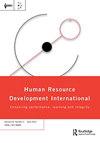应对自我效能和社会文化适应对台湾外籍人员技能发展的影响
IF 3.8
Q2 MANAGEMENT
引用次数: 1
摘要
摘要从外籍人士的角度来看,国际工作分配是一种高压态势,需要他们尽快调整。因此,国际人力资源管理(IHRM)文献中有相当一部分专门讨论外派人员调整问题。本研究借鉴Folkman和Lazarus的应对框架和Bandura的自我效能理论,考察了外派人员的应对自我效能和社会文化适应对其技能发展过程的影响。在此基础上,研究了社会文化适应对应对自我效能感和技能发展的中介作用。采用问卷调查的方法,对目前在台湾工作的161名外籍人员进行问卷调查。研究结果强调了应对自我效能感在外派人员社会文化调整中的关键作用,因此,应对自我效能水平较高的个体经历了较高水平的社会文化调整。研究结果进一步表明,这种相互关系还通过社会文化调整的中介作用促进了技能发展。本研究通过展示不同因素对技能发展的潜在影响,为台湾人力资源(HR)经理和外籍人士的技能培养提供了见解,从而为外籍人士文献做出了贡献。最后,作者还提出了启示、局限性和未来的研究方向。本文章由计算机程序翻译,如有差异,请以英文原文为准。
The impact of coping self-efficacy and sociocultural adjustment on skill development of expatriates in Taiwan
ABSTRACT From an expatriate’s viewpoint, an international job assignment is a high-pressure situation that requires them to adjust as expeditiously as possible. Therefore, a considerable strand of the international human resource management (IHRM) literature is dedicated to the subject of expatriate adjustment. Drawing upon Folkman and Lazarus’ coping framework and Bandura’s self-efficacy theory, the present study examines the influence of expatriates’ coping self-efficacy and sociocultural adjustment on their skill development process. Based on the hypotheses, mediating effects of sociocultural adjustment on coping self-efficacy and skill development were also studied. Using questionnaire survey method, data was collected from 161 expatriates currently working in Taiwan. The results highlighted the key role that coping self-efficacy plays in the sociocultural adjustment of expatriates, such that, the individuals with a higher level of coping self-efficacy were found to experience higher levels of sociocultural adjustment. The results further show that this interrelationship also facilitated skill development through the mediating effects of sociocultural adjustment. This study contributes to expatriate literature by showcasing the underlying impact of different factors on skill development and provide insights for skill-building to human resource (HR) managers and expatriates working in Taiwan. Lastly, the author also presents implications, limitations, and future research directions.
求助全文
通过发布文献求助,成功后即可免费获取论文全文。
去求助
来源期刊

HUMAN RESOURCE DEVELOPMENT INTERNATIONAL
MANAGEMENT-
CiteScore
11.40
自引率
11.10%
发文量
43
期刊介绍:
Human Resource Development International promotes all aspects of practice and research that explore issues of individual, group and organisational learning and performance. In adopting this perspective Human Resource Development International is committed to questioning the divide between practice and theory; between the practitioner and the academic; and between traditional and experimental methodological approaches. Human Resource Development International is committed to a wide understanding of ''organisation'' - one that extends through self-managed teams, voluntary work, or family businesses to global enterprises and bureaucracies. Human Resource Development International also commits itself to exploring the development of organisations and the life-long learning of people and their collectivity (organisation), their strategy and their policy, from all parts of the world. In this way Human Resource Development International will become a leading forum for debate and exploration of the interdisciplinary field of human resource development.
 求助内容:
求助内容: 应助结果提醒方式:
应助结果提醒方式:


